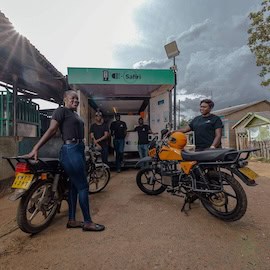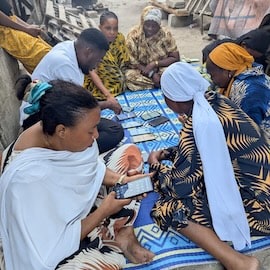Around the world, many governments, companies, academic institutions and others are recognizing the need for more sustainable mobility solutions, based on electric power instead of gas-burning internal combustion engines (ICE). This shift to electric mobility (e-mobility) can reduce emissions from transport — which are a key contributor to air pollution and climate change — while providing many other benefits, from technological efficiency and lifetime cost savings to user experience, such as a quieter drive and less regular maintenance. And when they are paired with clean energy sources for the electricity they use, electric vehicles (EVs) can have even greater climate benefits.
This transition is already underway in many places, and it involves a massive shift for consumers, businesses and other stakeholders involved in the production and adoption of different types of vehicles. But though a major technological change of this nature comes with challenges, it also creates an opportunity to develop more inclusive approaches to ensure that no one is left behind.
The shift to e-mobility brings such an opportunity, enabling the transport sector to engage women in new ways that are more equitable than what they have traditionally experienced in many markets. This may include more women as founders of new EV companies, or as designers, producers and drivers of new EVs — along with more mobility solutions designed with the needs of women in mind.
This evolution toward an EV-based transport sector is happening in Kenya. The transition is picking up across the country, with support from the government — primarily through financial incentives — and growing activity in the private sector. For instance, over 50 companies, with both local and international founders, currently provide electric bicycles, motorcycles, tuktuks, cars and buses to Kenyan consumers, as well as charging equipment and batteries. As a point of comparison in East Africa, Uganda’s e-mobility sector is more nascent, with just 11 e-mobility startups operating across the two-wheeler, car and bus sectors, and most of the country’s EV activity concentrated in e-motorcycles and battery swapping.
Given Kenya’s prominent position in the e-mobility space in Africa, along with its strong policy framework and its substantial progress in clean energy generation, the country has an opportunity to be a regional leader in ensuring a just and inclusive energy transition. In the article below, I’ll explore this opportunity in more detail, highlighting two e-mobility companies that are leading the way in boosting women’s involvement in the EV value chain.
The Gender Aspect of the Transition to E-Mobility
A recent report from the United Nations Environment Programme (UNEP) on e-mobility in Kenya focused on the gender aspect of a just transition to e-mobility. Among many insightful points, the report noted that despite some concerted efforts, women face many barriers in the transport sector, including “limited financial access, technical skills gaps, and persistent gender biases.” Employment data from Kenyan companies that shared data with UNEP indicates that women participate more in EV companies than in ICE businesses. But with women comprising 23-38% of EV company staff, less than 5% of EV drivers, and only two out of 44 founders of EV companies, the sector has significant room for improvement.
Of the growing number of local companies involved in e-mobility, some are working to tackle this gender issue head-on. One such company is E-Safiri, a Nairobi-based, woman-founded company started in 2020 to champion the adoption of e-mobility by expanding charging stations and battery swapping points powered by clean energy. In all of E-Safiri’s work, there is an emphasis on integrating women in the e-mobility value chain.
The William Davidson Institute at the University of Michigan (WDI) has engaged with companies like E-Safiri as part of our efforts to support enterprises, generate actionable insights, and develop partnerships related to energy and mobility in low- and middle-income countries (LMICs). We are especially interested in how enterprises like E-Safiri are working to enable a just transition in the energy and mobility space, by collaborating with local partners to increase women’s engagement in the sector.
Partnering to Address Women’s Challenges Through E-Mobility and Solar Solutions
One such collaboration is the Sun Run – Sustainable Transport Africa partnership, which E-Safiri co-founded in 2022. The collaboration was launched with funding from P4G, a multi-stakeholder initiative that accelerates partnerships related to climate and enterprise in Kenya, Colombia, Ethiopia, South Africa, Indonesia and Vietnam. The goal of the Sun Run partnership is to bring the e-mobility transformation to rural Kenya through the sale of EVs (e-bikes and e-tuktuks) and solar-powered charging and cold storage hubs. The partnership includes E-Safiri and Kiri EV, two startups that have together launched Sun Run as a joint venture. Also involved are Glasgow Caledonian University (as research and capacity building partner), Sustainable Transport Africa (as administrative partner) and P4G (as funding partner).
Sun Run provides EVs and solar-powered charging hubs (to charge EV batteries and other devices such as cell phones, and power community lighting and cold storage equipment) to rural agricultural and fishing communities in Kenya. Leveraging their respective areas of expertise, E-Safiri is in charge of designing and setting up the solar-powered charging hubs, while Kiri EV imports and assembles the EVs. Sun Run generates revenue through lease-to-use and lease-to-own models for the vehicles, and paid services of the charging hubs.
In the partnership’s first phase (2022-2023), Sun Run focused on designing and proving its model at pilot scale, setting up one solar-powered charging hub and providing 10 EVs to a rural agricultural community in Kisumu county, Kenya, located on the shores of Lake Victoria. Women are largely involved in agriculture there, and their work involves challenges like fluctuating fuel prices that increase operating costs, and a lack of transportation options that lead to lost revenue from agricultural products not making it to market in time. To address these challenges, Sun Run has refined the design and deployment of its products, working closely with three community-based organizations (CBOs), Awuoth Widows and Orphans CBO, Dunga Beach Management Unit, and Nyanam Widows Rising CBO. These organizations serve women and youth, and together they reach 1,500 women members. The CBOs have demonstrated great demand for Sun Run’s solutions, and indeed are the customers of Sun Run’s EVs and hosts of the solar-powered charging hub that E-Safiri operates. Sun Run’s second phase is currently underway, and will continue until March 2025: It is focused on scaling up the number of EVs and charging hubs in this community and beyond.
While many e-mobility businesses currently focus on urban settings due to their larger market sizes, higher incomes and more advanced infrastructure, Sun Run addresses the challenging needs of the rural market — and specifically those of women involved in agriculture. As a result, perhaps more so than in urban markets, the partners involved in Sun Run have had to make investments in infrastructure, market research, and engaging consumers and community members to overcome hurdles. Though Sun Run is set up as a for-profit company, grant funding and angel investments has been crucial to its success, allowing it to not only invest in assets that will generate revenue (EVs and charging stations), but also to undertake community engagement and training activities. Even with strong interest and demand from women active in the partner CBOs who use its EVs and charging stations, Sun Run has needed to provide extra training to enable their use of these technologies. For example, after the CBOs decided to acquire several e-bikes and e-tuktuks through Sun Run’s lease-to-own model, none of their women members could drive the vehicles, and they needed to hire men to do so. Through Sun Run, E-Safiri has been designing and delivering training sessions on how to drive and maintain EVs, to address this gap.
Sun Run is also designing its products and services to meet women users’ multiple, interrelated needs. The solar-powered charging stations are an example of this — by providing electricity in an off-grid setting, using a renewable source, they create an ongoing source of needed income for local women-turned-entrepreneurs, who provide excess electricity as a service for other community and productive uses. Similarly, the charging hubs are designed to power ice makers that provide cold storage services for the women who are vegetable and fish vendors, helping to keep their produce fresh and providing them with access to overnight storage solutions.
Linking business metrics to social and environmental goals
Just a few years after its launch, Sun Run is now at the revenue generation stage, and is able to meet several financial, social and environmental goals. The company has needed to address these areas in an integrated way, tracking impact metrics on each. Sun Run has been doing this by calculating the ROI of different investments, understanding the financial and social impacts for women who are using EVs and charging stations, and assessing the environmental impacts of EV use. For instance, women who are using Sun Run EVs to bring agricultural products to market saw their operational costs decrease by 60% and revenues increase by 40%, compared to using ICE vehicles or no vehicles. The company is also working with its research partner to gather feedback at different points, so it can adjust its approach as needed. For example, it is currently exploring different models for launching a network of agents in the community to operate the charging stations, and it’s gathering and analyzing data to understand and adapt its value proposition to different actors for different approaches.
Key to Sun Run’s approach and initial success is understanding and leveraging the different elements of an ecosystem that are required to achieve its goals. Partnerships with different actors in the ecosystem are of critical importance — the partners involved in the establishment of Sun Run each have complementary roles to play, as do its additional partners. These include the county government where the company is operating, which helps promote awareness of issues related to EV adoption, and the CBOs, which provide a way to engage local women to understand their needs as customers, gather feedback and identify a path to scale. As Sun Run looks to expand to other rural communities in Kenya, similar partnerships will be crucial to ensure that its solutions and approach can be adjusted to the specifics of these new markets.
What’s next for Sun Run?
Sun Run and its partners are working toward several concrete goals through March 2025, with a vision to continue growing in a self-sustaining way in the years that follow. Some of these goals include establishing 30 additional solar-powered charging hubs, providing 300 additional e-bikes and e-tuktuks to meet demonstrated demand in the current market, conducting additional training and knowledge dissemination activities related to renewable energy and e-mobility for women’s groups and CBOs, and implementing a women-led model to further scale the charging hubs. The company also hopes to increase women’s participation all along the EV and clean energy value chains — with an initial focus on involving women in battery charging and swapping operations, driving, and the maintenance of vehicles. These activities will involve different actors in the ecosystem and bring new opportunities for partnership.
As other startups and players in similar markets pursue e-mobility solutions, the Sun Run model and E-Safiri’s work in this space could be a valuable reference point. As such, the partners involved in Sun Run will be working on knowledge products to inform policy and regulation for sustainable rural mobility. We hope that through efforts like these — and other opportunities to share lessons and make connections — we can help to pave the way for further progress for all actors involved in fostering a just global energy and mobility transition.
Special thanks to Keith May and Cleopatra Adwar of E-Safiri for their collaboration on this article.
Dana Gorodetsky is Program Manager at the William Davidson Institute‘s Energy and Mobility team. NextBillion is a publication of the William Davidson Institute.
Photo courtesy of Ronny Onkeo, via E-Safiri.
Publisher: Source link






